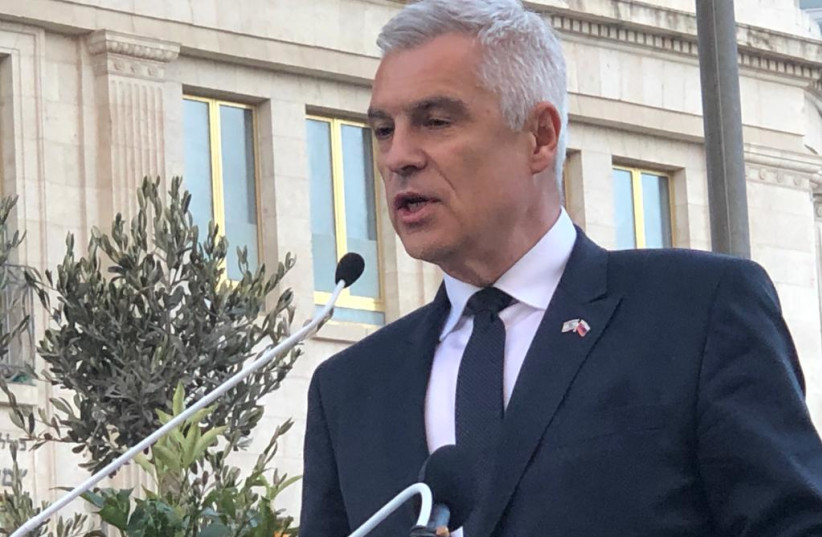Ukraine’s heroic stand against Russian aggression has made it part of the political bloc of Western countries and as such deserves their backing, Slovakian Foreign Minister Ivan Korcok told The Jerusalem Post.
“With this heroic defense and fight for the existence of freedom and sovereignty of its country,” Korcok said, “Ukraine has already become part of the political West, even without becoming an institutional part of the West... there is no doubt about that.”
Russia’s invasion of Ukraine, a country that borders Slovakia, has been of particular concern to Korcok, who on Thursday wrapped up a two-day trip to Israel to strengthen his country’s ties with the Jewish state.
He visited Israel during the Gaza war in May of last year, together with his counterparts from Germany and the Czech Republic, as a show of solidarity.
Slovakia was one of the Ukrainian border countries that Foreign Minister Yair Lapid visited in March, shortly after the start of the war on February 24. The Foreign Ministry and Israeli envoys have had a presence at the Ukrainian borders to help Israeli and Jewish refugees who are fleeing the war.

Slovakia and Israel also enjoy strong defense ties. Last year, Slovakia signed a major agreement with Israel to purchase radar systems to bolster its air defenses.
The concern in his country about Russia’s war against Ukraine is very high, Korcok said.
“I feel a fear of our citizens who all of a sudden are confronted with the war next door – it is literally on the border of Slovakia and Ukraine,” he explained.
It is “unthinkable” that “in the 21st century we see one country massively invading another country,” he said. Even worse, “Russia is trying to legitimize that aggression by depriving the country [Ukraine] of the right to exist. Don’t forget: That is the narrative by which the Russian Federation wants to justify the war and that is absolutely unacceptable.
“This aggression has ruined and literally destroyed the entire European security architecture,” Slovakia's foreign minister said.
Lapid has been one of the more vocal high-level Israeli diplomats to condemn Russia’s war on Ukraine.
“I appreciate the clear stance and position as presented by my friend and colleague Yair Lapid,” Korcok said.
“The entire democratic, community including Israel, has presented a very clear stance," he said. "This is a gross violation of international law by Russia and we count on Israel in this difficult situation, where we call on Russia to stop this war.”
THE SECURITY guarantee on which Slovakia most depends is its membership in the North Atlantic Treaty Organization, which is based on the principle that “an attack against one, is an attack against all,” Korcok stated.
Slovakia since 2008 has said it would support Ukraine’s inclusion in NATO, but the conversation now should focus on how to support Kyiv irrespective of the question of institutional membership is Western organizations, he said.
“This is a matter of survival,” Korcok said as he explained that his country is backing Ukraine both diplomatically and with military equipment.
While in Israel, the foreign minister met with President Isaac Herzog and visited Yad Vashem, the World Holocaust Remembrance Center. He discussed with Israeli officials ways to deepen economic and tourism ties, including opening a direct air route between Tel Aviv and Bratislava.
Korcok spoke with the Post on Wednesday evening on the sidelines of an event to mark the opening of the Slovak Institute, which will be a branch of the Slovakian Embassy, dedicated to art and cultural events. It is located on Jerusalem's King David Street.
The Slovakian foreign minister clarified to the Post that the opening of the office in west Jerusalem was a sign of the friendship between the two countries and should not be interpreted as a statement with regard to the diplomatic status of the city as the capital of Israel.
Most of the international community, including the United Nations, does not recognize that Jerusalem is Israel’s capital and as such, most of the embassies located in Israel are in the Tel Aviv area, including Slovakia's.
“When it comes to the city [Jerusalem] we follow the resolutions of the United Nations and the Security Council,” Korcok said.
“We believe that the final status must be an outcome of a solution between Israelis and Palestinians,” he explained. “This is not a political recognition. It is our sincere wish to be present here... I felt a lot of demand from the Slovak public [for this move].
“We have thousands of pilgrims coming every year here, and the Jewish community in Slovakia has been calling for having a presence here. We chose this cultural institute because culture is such an important part of our relations,” Korcok explained.
Lapid, however, was careful to mention that Jerusalem was Israel’s capital in his public remarks at the opening event of the Slovak Institute.
“Precisely where we are standing in Israel’s capital Jerusalem, historical alliances have been formed for thousands of years,” Lapid said. “This alliance between us joins those today. We appreciate and cherish this moment and will cherish it even more in years to come.”
